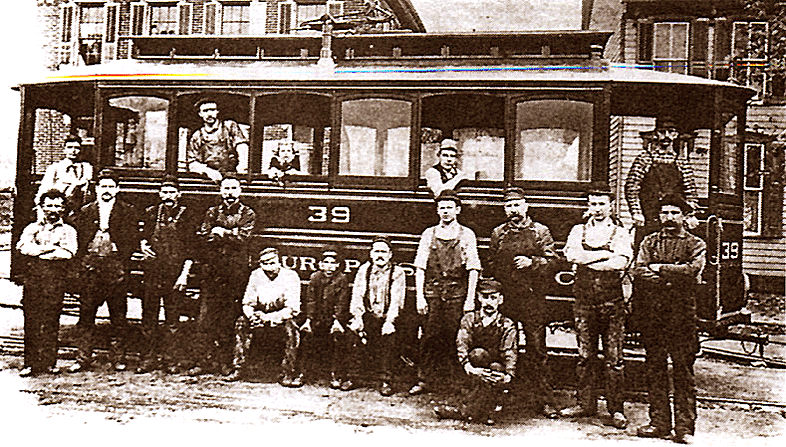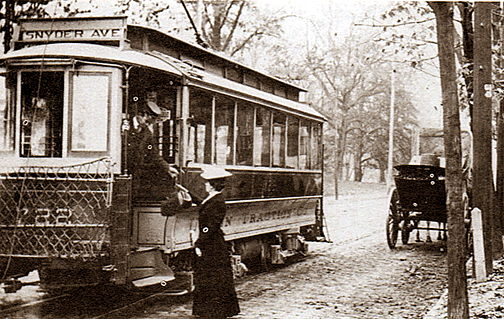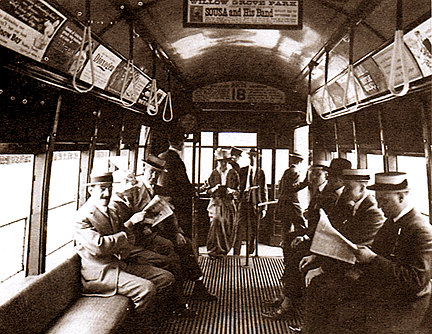|
The first trolley riders exhibited a
noticeable air of bravado. Men would hand their pocket watches to their
stay-behind womenfolk because the powerful electric currents flowing
invisibly about a car might magnetize them.

Some riders joked about how in 1888 New York State had
decided to electrocute murderers. Riders believed it prudent to disembark
hastily if a thunderstorm sprang up. On some lines it was a regular practice
to stop and pull-down trolley poles whenever thunder rumbled nearby.
Scarcely more than a decade after streetcar owners coaxed
the first cautious riders aboard the infant sparkers, real estate values
soared near the lines. When buying a house, people gave thought to whether
it was within easy walking distance of a trolley line.
 On most small trolley lines, an endearing tradition of
informality existed, very different from the bleak impersonal feeling of big
railroads. When a regular rider didn't make it to the stop on time in the
morning, the motorman would dally while he or she came puffing up. On most small trolley lines, an endearing tradition of
informality existed, very different from the bleak impersonal feeling of big
railroads. When a regular rider didn't make it to the stop on time in the
morning, the motorman would dally while he or she came puffing up.
The daytime conductor could be bribed into delivering a
parcel to a house several blocks away or into dropping a letter in the slot
at the depot by a gift of some oven-fresh muffins,.
People could time the events of their domestic lives by
the trolley's regularity. A wife knew by the screech of the wheels on the
curve down the street at 5:45 PM that her husband was on his way home from
work.
 Some conductors developed delusions that a
disproportionate number of men carrying bass violins, two-man saws, rolls of
barbed wire, and kegs of fish fertilizer attempted to board their cars. When
they succeeded, it always seemed to develop that fat women would lurch
crunchingly against the bass viols, or that fragile, jury-appealing people
would wound themselves on wire or saw. Or that a grandmother would take one
whiff of the fish barrel and swoon at a lawyer's feet, developing lower-back
pain as she fell. Some conductors developed delusions that a
disproportionate number of men carrying bass violins, two-man saws, rolls of
barbed wire, and kegs of fish fertilizer attempted to board their cars. When
they succeeded, it always seemed to develop that fat women would lurch
crunchingly against the bass viols, or that fragile, jury-appealing people
would wound themselves on wire or saw. Or that a grandmother would take one
whiff of the fish barrel and swoon at a lawyer's feet, developing lower-back
pain as she fell.
Ejection of unruly or nonpaying passengers proved to be a
sore point on most lines. According to the Motormanís Handbook, "No
passenger shall be forcibly ejected from a car for any cause whatsoever,
unless the conduct of the passenger is dangerous and grossly offensive.
No passenger will be ejected for mere intoxication, unless
said passenger becomes dangerous or offensive; such passenger must then be
ejected with great care, and must be guided until free from probable injury.
No passenger shall be put off at a. point where likely to be exposed to
danger." Law suits were an everyday fact of life for streetcar
companies.
Next:
Sundays at the Trolley Parks
|
